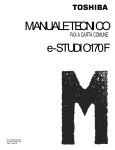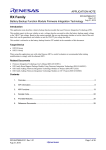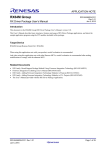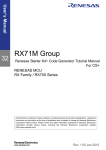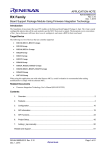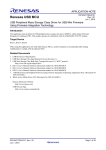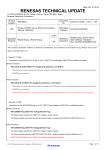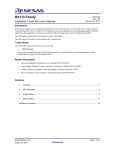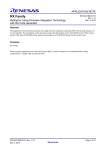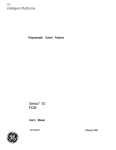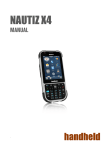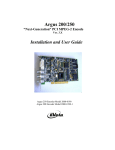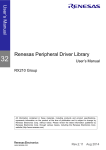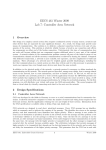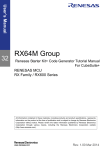Download RX Family - Renesas Electronics
Transcript
APPLICATION NOTE
RX Family
RSCAN Module Using Firmware Integration Technology
R01AN2805EU0100
Rev. 1.00
May 20, 2015
Introduction
This document describes the API for the RSCAN driver for the RX231. Message transfers can be done using 1-message
deep mailboxes, 4-message deep FIFOs, or any combination thereof.
NOTE: When developing an application with the RSKRX231 and the E1 emulator, and the E1 emulator is
powering the target board, be sure that it is supplying 5.0V and not 3.3V (specified in Debug Configuration) or
the RSCAN will not operate properly.
Target Device
The following is a list of devices that are currently supported by this API:
RX231 Group
When using this application note with other Renesas MCUs, careful evaluation is recommended after making
modifications to comply with the alternate MCU.
Related Documents
Firmware Integration Technology User’s Manual (R01AN1833EU)
Board Support Package Firmware Integration Technology Module (R01AN1685EU)
Adding Firmware Integration Technology Modules to Projects (R01AN1723EU)
Adding Firmware Integration Technology Modules to CubeSuite+ Projects (R01AN1826EJ)
R01AN2805EU0100 Rev. 1.00
May 20, 2015
Page 1 of 37
RX Family
RSCAN Module Using Firmware Integration Technology
Contents
1.
Overview ........................................................................................................................................... 4
2. API Information.................................................................................................................................. 5
2.1 Hardware Requirements ................................................................................................................... 5
2.2 Hardware Resource Requirements ................................................................................................... 5
2.3 Software Requirements ..................................................................................................................... 5
2.4 Limitations ......................................................................................................................................... 5
2.5 Supported Toolchains ....................................................................................................................... 5
2.6 Header Files ...................................................................................................................................... 5
2.7 Integer Types .................................................................................................................................... 5
2.8 Configuration Overview ..................................................................................................................... 6
2.9 Code Size .......................................................................................................................................... 7
2.10 API Data Types ................................................................................................................................. 8
2.10.1
Box IDs (mailboxes and FIFOs) ............................................................................................... 8
2.10.2
R_CAN_Open() Data Types .................................................................................................... 8
2.10.3
Callback function events .......................................................................................................... 9
2.10.4
R_CAN_InitChan() Data Types ................................................................................................ 9
2.10.5
R_CAN_ConfigFIFO() Data Types ........................................................................................... 9
2.10.6
R_CAN_AddRxRule() Data Types ......................................................................................... 10
2.10.7
R_CAN_SendMsg() Data Types ............................................................................................ 10
2.10.8
R_CAN_GetMsg() Data Types ............................................................................................... 10
2.10.9
R_CAN_GetHistoryEntry() Data Types .................................................................................. 10
2.10.10
R_CAN_GetStatusMask() Data Types ............................................................................... 10
2.10.11
R_CAN_GetCountErr() Data Types ................................................................................... 11
2.10.12
R_CAN_Control() Data Types ............................................................................................ 12
2.11 Return Values.................................................................................................................................. 12
2.12 Adding the Module to Your Project ................................................................................................. 12
3.
3.1
3.2
3.3
3.4
3.5
3.6
3.7
3.8
3.9
3.10
3.11
3.12
3.13
3.14
API Functions .................................................................................................................................. 14
Summary ......................................................................................................................................... 14
R_CAN_Open() ............................................................................................................................... 15
R_CAN_InitChan() .......................................................................................................................... 17
R_CAN_ConfigFIFO() ..................................................................................................................... 20
R_CAN_AddRxRule() ..................................................................................................................... 22
R_CAN_Control() ............................................................................................................................ 24
R_CAN_SendMsg() ........................................................................................................................ 26
R_CAN_GetMsg() ........................................................................................................................... 28
R_CAN_GetHistoryEntry() .............................................................................................................. 29
R_CAN_GetStatusMask() ............................................................................................................... 30
R_CAN_GetCountFIFO() ................................................................................................................ 32
R_CAN_GetCountErr() ................................................................................................................... 33
R_CAN_Close()............................................................................................................................... 34
R_CAN_GetVersion() ...................................................................................................................... 35
4. Demo Project................................................................................................................................... 36
4.1 rscan_demo_rskrx231 ..................................................................................................................... 36
5.
Website and Support ....................................................................................................................... 37
R01AN2805EU0100 Rev. 1.00
May 20, 2015
Page 2 of 37
RX Family
RSCAN Module Using Firmware Integration Technology
Revision Record ...................................................................................................................................... 38
General Precautions in the Handling of MPU/MCU Products ................................................................. 39
R01AN2805EU0100 Rev. 1.00
May 20, 2015
Page 3 of 37
RX Family
RSCAN Module Using Firmware Integration Technology
1. Overview
This driver is compatible with the RSCAN driver provided with the RZ/A1. Although the RSCAN peripheral on the
RX231 is single channel, the API remains the same. A static configuration of mailboxes and FIFOs (boxes) is
hardcoded as is done with the RZ/A1, but much fewer resources are available for use.
All mailboxes are one-message deep. There are 4 transmit mailboxes and 4 receive mailboxes. The transmit mailboxes
can optionally be configured for interrupt operation, whereas the receive mailboxes cannot. The transmit mailboxes do
not accept a message for transmit until the previous message has been sent. The receive mailboxes always contain the
most recent message received, overwriting the previous contents without an error condition being generated. There is no
hardware interrupt option available.
The transmit and receive FIFOs are 4-messages deep. FIFOs are used for the sending and receiving of messages just
like a mailbox. These can optionally be configured to be interrupt driven. Setting a receive FIFO to interrupt on every
message received would behave similar to a receive mailbox with interrupt support.
There is a special FIFO called the Transmit History FIFO, and this FIFO is 8 entries deep. The History FIFO logs all
messages tagged in an R_CAN_SendMsg() call in the order they are sent. Note that any FIFO usage is optional and are
not required for normal operation.
The RSCAN hardware processes all messages transmitted on the bus, but uses Receive Rules to determine which
messages to keep and which to ignore. A Receive Rule consists of two parts. The first part performs filtering on
different parts of the message to see if the message should be kept. The second part specifies which box (receive
mailbox or receive FIFO) to route the message to. After the hardware routes a message to a box, the function
R_CAN_GetMsg() is used to read a message from the box.
There are two types of interrupts available- global interrupts and channel interrupts. The global interrupts indicate when
a receive FIFO has received a message as well as when a global error occurs. These interrupts are enabled in the
r_rscan_rx_config.h file. The driver detects the interrupt and calls a user callback function specified in R_CAN_Open()
to process the particular event(s). The channel interrupts handle several transmit conditions as well as channel errors.
These interrupts are also enabled in the r_rscan_rx_config.h file. The driver detects the interrupt and calls a user
callback function specified in R_CAN_InitChan() to process the particular event(s).
By default, the following interrupts are enabled:
RX, TX, or History FIFO threshold reached
RX, TX, or History FIFO overflow occurred
Channel entered Error Passive state
Channel entered Bus Off state
Channel recovered from Bus Off state
The following sequence of function calls is used to setup the CAN:
R_CAN_Open();
R_CAN_InitChan();
// do for 1-5 channels
R_CAN_ConfigFIFO(); // do for 0 or more FIFOs
R_CAN_AddRxRule(); // do for 1-320 rules
Once the CAN is setup, the peripheral should enter normal communications mode or a test mode.
R_CAN_Control();
// Use CAN_CMD_SET_MODE_COMM or CAN_CMD_SET_MODE_TST_xxx
R01AN2805EU0100 Rev. 1.00
May 20, 2015
Page 4 of 37
RX Family
RSCAN Module Using Firmware Integration Technology
2. API Information
This Driver API follows the Renesas API naming standards.
2.1
Hardware Requirements
This driver utilizes the RSCAN peripheral.
2.2
Hardware Resource Requirements
In addition to the RSCAN peripheral, the driver requires:
2.3
Two pins allocated for the CAN channel
Software Requirements
This driver is dependent upon
2.4
r_bsp v2.90
Limitations
Not all features of the peripheral are utilized. These include:
2.5
Configurable depth transmit and receive FIFOs (all fixed at 4 instead of configurable 1 to 16)
Transmit by message ID priority (will be done by mailbox number, 0 being highest priority)
Transmit FIFO interval transmission
Transmit mirroring
Filter on mirrored messages
DLC substitution
Multiple destinations for each received message (will fix at 1 destination; could be up to 3)
Different methods of Bus Off recovery (will be ISO11898-1 compliant)
Forcible return from Bus Off
Selection of protocol error flag accumulation vs first occurrence (will hard-code to accumulative for all
channels)
Supported Toolchains
This driver is tested and working with the following toolchains:
2.6
Renesas RXC v2.02
Header Files
All API calls and their supporting interface definitions are located in “r_rscan_rx_if.h”.
Build-time configuration options are set in the file "r_rscan_rx_config.h” (the default values are defined in the file
“r_rscan_rx_config_reference.h”).
Both of these files should be included by the user’s application.
2.7
Integer Types
This project uses ANSI C99 “Exact width integer types” in order to make the code clearer and more portable. These
types are defined in stdint.h.
R01AN2805EU0100 Rev. 1.00
May 20, 2015
Page 5 of 37
RX Family
2.8
RSCAN Module Using Firmware Integration Technology
Configuration Overview
Static configuration options for this driver are set by the user via the file r_rscan_rx_config.h.
Configuration options in r_rscan_rx_config.h
Equate
Default
Value
CAN_CFG_PARAM_CHECKING_ENABLE
1
CAN_CFG_CLOCK_SOURCE
0
CAN_CFG_INT_PRIORITY
5
CAN_CFG_INT_RXFIFO_THRESHOLD
1
CAN_CFG_INT_DLC_ERR
0
CAN_CFG_INT_FIFO_OVFL
1
CAN_CFG_INT_HIST_FIFO_OVFL
1
CAN_CFG_INT_TXFIFO_THRESHOLD
1
CAN_CFG_INT_HIST_FIFO_THRESHOLD
1
CAN_CFG_INT_MBX_TX_COMPLETE
0
R01AN2805EU0100 Rev. 1.00
May 20, 2015
Description
Setting to 0 removes parameter checking from the code.
Setting to 1 includes parameter checking in the code.
If this equate is 0, the CAN clock source is ½ the
peripheral clock speed (clkc). If this equate is 1, the
source is the external CAN_CLOCK (clk_xincan).
Priority level for all CAN interrupts (0-31)
Setting to 0 disables interrupt when an RXFIFO
threshold is reached.
Setting to 1 enables interrupt.
Requires FIFO to be initialized via
R_CAN_ConfigFIFO().
CAN_EVT_RXFIFO_THRESHOLD is passed to the
main callback function.
Setting to 0 disables interrupt when a DLC error is
detected.
Setting to 1 enables interrupt.
CAN_EVT_GLOBAL_ERR is passed to the main
callback function.
Setting to 0 disables interrupt when a TX, GW, or RX
FIFO overflows.
Setting to 1 enables interrupt.
Requires FIFO to be initialized via
R_CAN_ConfigFIFO().
CAN_EVT_ GLOBAL_ERR is passed to the main
callback function.
Setting to 0 disables interrupt when a History FIFO
overflows.
Setting to 1 enables interrupt.
Requires FIFO to be initialized via
R_CAN_ConfigFIFO().
CAN_EVT_ GLOBAL_ERR is passed to the main
callback function.
Setting to 0 disables interrupt when a TXFIFO threshold
is reached.
Setting to 1 enables interrupt.
Requires FIFO to be initializes via
R_CAN_ConfigFIFO().
CAN_EVT_TRANSMIT is passed to the channel
callback function.
Setting to 0 disables interrupt when the HIST_FIFO
threshold is reached. Setting to 1 enables interrupt.
Requires FIFO to be initialized via
R_CAN_ConfigFIFO().
CAN_EVT_ TRANSMIT is passed to the channel
callback function.
Setting to 0 disables interrupt when the mailbox
completes transmission.
Setting to 1 enables interrupt.
CAN_EVT_ TRANSMIT is passed to the channel
callback function.
Page 6 of 37
RX Family
RSCAN Module Using Firmware Integration Technology
CAN_CFG_INT_MBX_TX_ABORTED
0
CAN_CFG_INT_BUS_ERROR
0
CAN_CFG_INT_ERR_WARNING
0
CAN_CFG_INT_ERR_PASSIVE
1
CAN_CFG_INT_BUS_OFF_ENTRY
1
CAN_CFG_INT_BUS_OFF_RECOVERY
1
CAN_CFG_INT_OVERLOAD_FRAME_TX
0
CAN_CFG_INT_BUS_LOCK
0
CAN_CFG_INT_ARB_LOST
0
Setting to 0 disables interrupt when the mailbox transmit
is aborted.
Setting to 1 enables interrupt.
CAN_EVT_ TRANSMIT is passed to the channel
callback function.
Setting to 0 disables interrupt when a bus error is
detected.
Setting to 1 enables interrupt.
CAN_EVT_CHANNEL_ERR is passed to the channel
callback function.
Setting to 0 disables interrupt when an error warning is
detected.
Setting to 1 enables interrupt.
CAN_EVT_CHANNEL_ERR is passed to the channel
callback function.
Setting to 0 disables interrupt when an error passive is
detected.
Setting to 1 enables interrupt.
CAN_EVT_CHANNEL_ERR is passed to the channel
callback function.
Setting to 0 disables interrupt when a Bus Off error is
detected.
Setting to 1 enables interrupt.
CAN_EVT_CHANNEL_ERR is passed to the channel
callback function.
Setting to 0 disables interrupt when a Bus Off recovery
is detected.
Setting to 1 enables interrupt.
CAN_EVT_CHANNEL_ERR is passed to the channel
callback function.
Setting to 0 disables interrupt when an overload is
detected.
Setting to 1 enables interrupt.
CAN_EVT_CHANNEL_ERR is passed to the channel
callback function.
Setting to 0 disables interrupt when a bus lock is
detected.
Setting to 1 enables interrupt.
CAN_EVT_CHANNEL_ERR is passed to the channel
callback function.
Setting to 0 disables interrupt when arbitration loss is
detected.
Setting to 1 enables interrupt.
CAN_EVT_CHANNEL_ERR is passed to the channel
callback function.
Table 1: Info about the configuration
2.9
Code Size
The code size is based upon optimization level 2 for the RXC Toolchain. These code sizes include all interrupt
handlers (configured active or not), as well as all FIFO support code.
ROM and RAM code sizes
RX231
With Parameter Checking
Without Parameter Checking
ROM: 8127 bytes code
ROM: 4330 bytes code
R01AN2805EU0100 Rev. 1.00
May 20, 2015
Page 7 of 37
RX Family
RSCAN Module Using Firmware Integration Technology
RAM: 20 bytes
RAM: 20 bytes
Table 2: ROM and RAM code size
2.10
API Data Types
This section details the data types that are used with the driver’s API functions.
2.10.1
Box IDs (mailboxes and FIFOs)
typedef enum e_can_box
{
CAN_BOX_NONE
= 0,
// unused parameter value
CAN_BOX_CH0_TXMBX_0
CAN_BOX_CH0_TXMBX_1
CAN_BOX_CH0_TXMBX_2
CAN_BOX_CH0_TXMBX_3
=
=
=
=
(CAN_FLG_TXMBX
(CAN_FLG_TXMBX
(CAN_FLG_TXMBX
(CAN_FLG_TXMBX
|
|
|
|
0),
1),
2),
3),
CAN_BOX_RXMBX_0
CAN_BOX_RXMBX_1
CAN_BOX_RXMBX_2
CAN_BOX_RXMBX_4
=
=
=
=
(CAN_FLG_RXMBX
(CAN_FLG_RXMBX
(CAN_FLG_RXMBX
(CAN_FLG_RXMBX
|
|
|
|
0),
1),
3),
4),
CAN_BOX_RXFIFO_0
CAN_BOX_RXFIFO_1
= (CAN_FLG_FIFO | CAN_MASK_RXFIFO_0),
= (CAN_FLG_FIFO | CAN_MASK_RXFIFO_1),
CAN_BOX_TXFIFO
= (CAN_FLG_FIFO | CAN_MASK_CH0_TXFIFO_0),
CAN_BOX_HIST_FIFO
} can_box_t;
2.10.2
= (CAN_FLG_FIFO | CAN_MASK_CH0_HIST_FIFO),
R_CAN_Open() Data Types
typedef enum e_can_timestamp_src
{
CAN_TIMESTAMP_SRC_HALF_PCLK = 0,
CAN_TIMESTAMP_SRC_CANMCLK
= 1,
CAN_TIMESTAMP_SRC_END_ENUM
} can_timestamp_src_t;
// obtained from EXTAL pin
typedef enum e_can_timestamp_div
{
CAN_TIMESTAMP_DIV_1
= 0,
CAN_TIMESTAMP_DIV_2
= 1,
CAN_TIMESTAMP_DIV_4
= 2,
CAN_TIMESTAMP_DIV_8
= 3,
CAN_TIMESTAMP_DIV_16
= 4,
CAN_TIMESTAMP_DIV_32
= 5,
CAN_TIMESTAMP_DIV_64
= 6,
CAN_TIMESTAMP_DIV_128
= 7,
CAN_TIMESTAMP_DIV_256
= 8,
CAN_TIMESTAMP_DIV_512
= 9,
CAN_TIMESTAMP_DIV_1024 = 10,
CAN_TIMESTAMP_DIV_2048 = 11,
CAN_TIMESTAMP_DIV_4096 = 12,
CAN_TIMESTAMP_DIV_8192 = 13,
CAN_TIMESTAMP_DIV_16384 = 14,
R01AN2805EU0100 Rev. 1.00
May 20, 2015
Page 8 of 37
RX Family
RSCAN Module Using Firmware Integration Technology
CAN_TIMESTAMP_DIV_32768 = 15,
CAN_TIMESTAMP_DIV_END_ENUM
} can_timestamp_div_t;
typedef struct st_can_cfg
{
can_timestamp_src_t
can_timestamp_div_t
} can_cfg_t;
2.10.3
timestamp_src;
timestamp_div;
Callback function events
typedef enum e_can_cb_evt
{
// Main Callback Events
CAN_EVT_RXFIFO_THRESHOLD,
CAN_EVT_GLOBAL_ERR,
// callback function events
// RX FIFO threshold
// RX or Hist FIFO overflow, or DLC error
// Channel Callback Events
CAN_EVT_TRANSMIT,
// mbx tx complete or aborted,
//
tx or history FIFO threshold
CAN_EVT_CHANNEL_ERR,
} can_cb_evt_t;
2.10.4
R_CAN_InitChan() Data Types
typedef struct st_can_bitrate
{
uint16_t
prescaler; //
uint8_t
tseg1;
//
uint8_t
tseg2;
//
uint8_t
sjw;
//
} can_bitrate_t;
1-1024
4-16
2-8
1-4
/* Sample settings for 500kbps */
#define CAN_RSK_27MHZ_PCLKB_500KBPS_PRESCALER
#define CAN_RSK_27MHZ_PCLKB_500KBPS_TSEG1
#define CAN_RSK_27MHZ_PCLKB_500KBPS_TSEG2
#define CAN_RSK_27MHZ_PCLKB_500KBPS_SJW
3
5
3
1
#define
#define
#define
#define
CAN_RSK_32MHZ_PCLKB_500KBPS_PRESCALER
CAN_RSK_32MHZ_PCLKB_500KBPS_TSEG1
CAN_RSK_32MHZ_PCLKB_500KBPS_TSEG2
CAN_RSK_32MHZ_PCLKB_500KBPS_SJW
2
11
4
4
#define
#define
#define
#define
CAN_RSK_8MHZ_XTAL_500KBPS_PRESCALER
CAN_RSK_8MHZ_XTAL_500KBPS_TSEG1
CAN_RSK_8MHZ_XTAL_500KBPS_TSEG2
CAN_RSK_8MHZ_XTAL_500KBPS_SJW
1
10
5
1
2.10.5
//
//
//
//
//
alternate settings
2
5
2
1
R_CAN_ConfigFIFO() Data Types
typedef enum e_can_fifo_threshold
{
CAN_FIFO_THRESHOLD_2
= 3,
CAN_FIFO_THRESHOLD_3
= 5,
CAN_FIFO_THRESHOLD_6
= 5,
CAN_FIFO_THRESHOLD_FULL = 7,
R01AN2805EU0100 Rev. 1.00
May 20, 2015
//
//
//
//
//
//
NOTE: History FIFO can only have a
threshold of 1 or 12
4/8 of 4
6/8 of 4
History FIFO Only!
8/8 of 4
Page 9 of 37
RX Family
RSCAN Module Using Firmware Integration Technology
CAN_FIFO_THRESHOLD_1
= 8,
CAN_FIFO_THRESHOLD_END_ENUM
} can_fifo_threshold_t;
2.10.6
R_CAN_AddRxRule() Data Types
typedef struct st_can_filter
{
bool_t
check_ide;
uint8_t
ide;
bool_t
check_rtr;
uint8_t
rtr;
uint32_t
id;
uint32_t
id_mask;
uint8_t
min_dlc;
uint16_t
label;
} can_filter_t;
2.10.7
// 12-bit label from receive rule
R_CAN_GetHistoryEntry() Data Types
typedef struct st_can_history
{
can_box_t
box_id;
uint8_t
label;
} can_history_t;
2.10.10
// no retries on error; txmbx only
// true if want to log
// 8-bit label for History FIFO
R_CAN_GetMsg() Data Types
typedef struct st_can_rxmsg
{
uint8_t
ide;
uint8_t
rtr;
uint32_t
id;
uint8_t
dlc;
uint8_t
data[8];
uint16_t
label;
uint16_t
timestamp;
} can_rxmsg_t;
2.10.9
// 12-bit label
R_CAN_SendMsg() Data Types
typedef struct st_can_txmsg
{
uint8_t
ide;
uint8_t
rtr;
uint32_t
id;
uint8_t
dlc;
uint8_t
data[8];
bool_t
one_shot;
bool_t
log_history;
uint8_t
label;
} can_txmsg_t;
2.10.8
// every message
// box which sent message
// associated 8-bit label
R_CAN_GetStatusMask() Data Types
R01AN2805EU0100 Rev. 1.00
May 20, 2015
Page 10 of 37
RX Family
RSCAN Module Using Firmware Integration Technology
typedef enum e_can_stat
{
CAN_STAT_FIFO_EMPTY,
CAN_STAT_FIFO_THRESHOLD,
CAN_STAT_FIFO_OVFL,
CAN_STAT_RXMBX_FULL,
CAN_STAT_GLOBAL_ERR,
CAN_STAT_CH_TXMBX_SENT,
CAN_STAT_CH_TXMBX_ABORTED,
CAN_STAT_CH_ERROR,
CAN_STAT_END_ENUM
} can_stat_t;
// bits reset after reading
//
//
//
//
DLC error bit is
bits reset after
bits reset after
bits reset after
reset after reading
reading
reading
reading
/* Returned mask values (multiple bits may be set at the same time)
/* CAN_STAT_CH_TXMBX_SENT, CAN_STAT_CH_TXMBX_ABORTED */
#define CAN_MASK_TXMBX_0
(0x0001)
#define CAN_MASK_TXMBX_1
(0x0002)
#define CAN_MASK_TXMBX_2
(0x0004)
#define CAN_MASK_TXMBX_3
(0x0008)
/* CAN_STAT_RXMBX_FULL */
#define CAN_MASK_RXMBX_0
#define CAN_MASK_RXMBX_1
#define CAN_MASK_RXMBX_2
#define CAN_MASK_RXMBX_3
(0x0001)
(0x0002)
(0x0004)
(0x0008)
/* CAN_STAT_FIFO_EMPTY, CAN_STAT_FIFO_THRESHOLD, CAN_STAT_FIFO_OVFL */
#define CAN_MASK_RXFIFO_0
(0x00000001)
#define CAN_MASK_RXFIFO_1
(0x00000002)
#define CAN_MASK_TXFIFO
(0x00000100)
#define CAN_MASK_HIST_FIFO
(0x00800000)
/* CAN_STAT_GLOBAL_ERR */
#define CAN_MASK_ERR_DLC
#define CAN_MASK_ERR_RX_OVFL
#define CAN_MASK_ERR_HIST_OVFL
#define CAN_MASK_ERR_FIFO_OVFL
(0x0001)
(0x0002)
(0x0004)
(0x0006)
/* CAN_STAT_CH_ERROR */
#define CAN_MASK_ERR_PROTOCOL
#define CAN_MASK_ERR_WARNING
#define CAN_MASK_ERR_PASSIVE
#define CAN_MASK_ERR_BUS_OFF_ENTRY
#define CAN_MASK_ERR_BUS_OFF_EXIT
#define CAN_MASK_ERR_OVERLOAD
#define CAN_MASK_ERR_DOMINANT_LOCK
#define CAN_MASK_ERR_ARB_LOST
#define CAN_MASK_ERR_STUFF
#define CAN_MASK_ERR_FORM
#define CAN_MASK_ERR_ACK
#define CAN_MASK_ERR_CRC
#define CAN_MASK_ERR_RECESSIVE_BIT
#define CAN_MASK_ERR_DOMINANT_BIT
#define CAN_MASK_ERR_ACK_DELIMITER
(0x0001)
(0x0002)
(0x0004)
(0x0008)
(0x0010)
(0x0020)
(0x0040)
(0x0080)
(0x0100)
(0x0200)
(0x0400)
(0x0800)
(0x1000)
(0x2000)
(0x4000)
2.10.11
R_CAN_GetCountErr() Data Types
typedef enum e_can_count
R01AN2805EU0100 Rev. 1.00
May 20, 2015
Page 11 of 37
RX Family
RSCAN Module Using Firmware Integration Technology
{
CAN_COUNT_RX_ERR,
CAN_COUNT_TX_ERR,
CAN_COUNT_END_ENUM
} can_count_t;
2.10.12
R_CAN_Control() Data Types
typedef enum e_can_cmd
{
CAN_CMD_ABORT_TX,
CAN_CMD_RESET_TIMESTAMP,
CAN_CMD_SET_MODE_COMM,
CAN_CMD_SET_MODE_TST_STANDARD,
CAN_CMD_SET_MODE_TST_LISTEN,
CAN_CMD_SET_MODE_TST_EXT_LOOPBACK,
CAN_CMD_SET_MODE_TST_INT_LOOPBACK,
CAN_CMD_END_ENUM
} can_cmd_t;
2.11
// argument: transmit mailbox id
// start normal bus communications
Return Values
API function return values. This enum is found in r_rscan_rx_if.h along with the API function declarations.
typedef enum e_can_err
{
CAN_SUCCESS=0,
CAN_ERR_OPENED,
CAN_ERR_NOT_OPENED,
CAN_ERR_INIT_DONE,
CAN_ERR_CH_NO_INIT,
CAN_ERR_INVALID_ARG,
CAN_ERR_MISSING_CALLBACK,
CAN_ERR_MAX_RULES,
CAN_ERR_BOX_FULL,
CAN_ERR_BOX_EMPTY,
CAN_ERR_ILLEGAL_MODE
} can_err_t;
2.12
// CAN API error codes
//
//
//
//
//
//
//
//
//
//
Call to Open already made
Call to Open not yet made
Call to InitChan already made for channel
Channel not initialized
Invalid argument passed to function
Callback func not provided and ints requested
Max configured rules already present
Transmit mailbox or FIFO is full
Receive mailbox or FIFO is full
Not in proper mode for request
Adding the Module to Your Project
For detailed explanation of how to add a FIT Module to your project, see document R01AN1723EU “Adding FIT
Modules to Projects”.
In general, a FIT Module may be added in 3 ways:
1.
Using e2studio File>New>Renesas FIT Module. This adds the module and project include paths.
2.
Using e2studio File>Import>General>Archive File from the project context menu.
3.
Unzipping the .zip file into the project directory directly from Windows.
When using methods 2or 3, the include paths must be manually added to the project. This is done in e2studio from the
project context menu by selecting Properties>C/C++ Build>Settings and selecting Compiler>Source in the ToolSettings
tab. The green “+” sign in the box to the right is used to pop a dialog box to add the include paths. In that box, click on
the Workspace button and select the directories needed from the project tree structure displayed. The directories needed
for this module are:
${workspace_loc:/${ProjName}/r_rscan_rx
${workspace_loc:/${ProjName}/r_rscan_rx/src
R01AN2805EU0100 Rev. 1.00
May 20, 2015
Page 12 of 37
RX Family
RSCAN Module Using Firmware Integration Technology
${workspace_loc:/${ProjName}/r_config
Regardless of the method used to add the FIT Module and include paths to your project, it is necessary to configure the
module for your application. Options available for configuration may be found and edited in:
\r_config\r_rscan_rx_config.h.
A reference copy (not for editing) containing the default values for this file is stored in:
\r_rscan_rx\ref\r_rscan_rx_config_reference.h.
Any application file which calls a module’s API function should include the interface file “r_rscan_rx_if.h” and
configuration file “r_rscan_rx_config.h”. This file contains the API function declarations and all structures and
enumerations necessary to use the module.
R01AN2805EU0100 Rev. 1.00
May 20, 2015
Page 13 of 37
RX Family
RSCAN Module Using Firmware Integration Technology
3. API Functions
3.1
Summary
The following functions are included in this design:
Function
Description
R_CAN_Open()
Initializes the driver’s internal structures and all of the receive mailboxes.
R_CAN_InitChan()
Sets the bit rate clock for the channel and initializes all of the transmit mailboxes.
R_CAN_ConfigFIFO()
Initializes a FIFO for usage. This function should not be called if FIFOs are not used.
R_CAN_AddRxRule()
R_CAN_SendMsg()
Adds a receive rule to a channel. Specifies receive message filter and destination
routing.
Loads a message into a transmit mailbox or FIFO for transmission.
R_CAN_GetMsg()
Fetches a message from a receive mailbox or FIFO.
R_CAN_GetHistoryEntry()
Fetches a log entry from a transmit history FIFO.
R_CAN_GetStatusMask()
R_CAN_GetCountFIFO()
Returns a 32-bit mask based upon the status requested. Bit #defines have the form
CAN_MASK_xxx.
Returns the number of messages in a FIFO.
R_CAN_GetCountErr()
Returns the number of transmit or receive errors.
R_CAN_Control()
Handles special operations and mode changes.
R_CAN_Close()
Removes power to the CAN peripheral and disables the associated interrupts.
R_CAN_GetVersion()
Returns the driver version number.
R01AN2805EU0100 Rev. 1.00
May 20, 2015
Page 14 of 37
RX Family
3.2
RSCAN Module Using Firmware Integration Technology
R_CAN_Open()
This function initializes the driver’s internal structures and all of the receive mailboxes.
Format
can_err_t
R_CAN_Open(can_cfg_t *p_cfg,
void
(* const p_callback)(can_cb_evt_t
void
event,
*p_args));
Parameters
p_cfg
Pointer to configuration structure. The element type definitions are provided in Section 2.10.1.
typedef struct st_can_cfg
{
can_timestamp_src_t
can_timestamp_div_t
} can_cfg_t;
ts_source;
ts_divisor;
p_callback
Optional pointer to main callback function. Must be present if interrupts are enabled in r_rscan_rx_config.h for
RX FIFOs or global errors
event
First parameter for callback function. Specifies the interrupt source (see Section 2.10.3)
p_args
Second parameter for callback function (unused).
Return Values
CAN_SUCCESS:
CAN_ERR_OPENED:
CAN_ERR_INVALID_ARG:
CAN_ERR_MISSING_CALLBACK:
Successful
Call to Open already made
An element of the p_cfg structure contains an invalid value.
A callback function was not provided and
a main callback interrupt is enabled in config.h
Properties
Prototyped in file “r_rscan_rx_if.h”
Description
This function initializes the driver’s internal structures, applies clock to the peripheral, and sets the Global and Channel
Modes to Reset. The timestamp is configured as per the p_cfg argument, and all receive mailboxes are initialized.
If interrupts are enabled in r_rscan_rx_config.h for receive FIFO thresholds, or DLC or FIFO overflow errors, a
callback function must be provided here. Otherwise, NULL is entered.
Reentrant
No.
Example: Polling Configuration
/* All main callback interrupt sources are set to 0 in r_rscan_rx_config.h
*/
can_cfg_t
can_err_t
config;
err;
/* Configure timestamp and Open driver */
config.timestamp_src = CAN_TIMESTAMP_SRC_HALF_PCLK;
config.timestamp_div = CAN_TIMESTAMP_DIV_1024;
R01AN2805EU0100 Rev. 1.00
May 20, 2015
Page 15 of 37
RX Family
RSCAN Module Using Firmware Integration Technology
err = R_CAN_Open(&config, NULL);
Example: Interrupt Configuration
/* 1+ main callback interrupt sources are set to 1 in r_rscan_rx_config.h */
can_cfg_t
can_err_t
config;
err;
/* Configure timestamp and Open driver */
config.timestamp_src = CAN_TIMESTAMP_SRC_HALF_PCLK;
config.timestamp_div = CAN_TIMESTAMP_DIV_1024;
err = R_CAN_Open(&config, MyCallback);
/* Sample callback function */
void MyCallback(can_cb_evt_t event, void *p_args)
{
uint32_t
mask;
can_err_t err;
if (event == CAN_EVT_RXFIFO_THRESHOLD)
{
mask = R_CAN_GetStatusMask(CAN_STAT_FIFO_THRESHOLD, NULL, &err);
/* check RXFIFOs in use */
if (mask & CAN_MASK_RXFIFO_1)
{
/* read messages */
}
}
else if (event == CAN_EVT_GLOBAL_ERR)
{
mask = R_CAN_GetStatusMask(CAN_STAT_GLOBAL_ERR, NULL, &err);
if (mask & CAN_MASK_ERR_DLC)
{
/* handle DLC error */
}
if (mask & CAN_MASK_ERR_FIFO_OVFL)
{
mask = R_CAN_GetStatusMask(CAN_STAT_FIFO_OVFL, NULL, &err);
/* check the RXFIFOs, GWFIFO, and HIST_FIFOs in use */
if (mask & CAN_MASK_HIST_FIFO)
{
/* handle error */
}
}
}
}
Special Notes:
None.
R01AN2805EU0100 Rev. 1.00
May 20, 2015
Page 16 of 37
RX Family
3.3
RSCAN Module Using Firmware Integration Technology
R_CAN_InitChan()
This function sets the bit rate clock for the channel and initializes all of the transmit mailboxes.
Format
can_err_t
R_CAN_InitChan(uint8_t
chan,
can_bitrate_t *p_baud,
void
(* const p_chcallback)(uint8_t
can_cb_evt_t
void
chan,
event,
*p_args));
Parameters
chan
Channel to initialize (0 is only valid value).
p_baud
Pointer to bit rate structure. See Table 21.6 in the Hardware User’s Manual for limitations on bit rate based upon
the clock frequency and number of channels used. See Section 21.10.1.2 for bit time settings.
typedef struct st_can_bitrate
{
uint16_t
prescaler;
uint8_t
tseg1;
uint8_t
tseg2;
uint8_t
sjw;
} can_bitrate_t;
p_chcallback
Optional pointer to channel callback function. Must be present if interrupts are enabled in r_rscan_rx_config.h
for TX mailboxes, TX FIFOs, History FIFOs, or bus errors.
channel
First parameter for channel callback function. Specifies the channel interrupt occurred on (always 0).
event
Second parameter for channel callback function. Specifies the interrupt source (see Section 2.10.3)
p_args
Third parameter for callback function (unused).
Return Values
CAN_SUCCESS:
CAN_ERR_ILLEGAL_MODE:
CAN_ERR_INVALID_ARG:
CAN_ERR_MISSING_CALLBACK:
config.h
Successful
Not in global reset mode (results from call to Open())
An invalid argument was provided
A callback function was not provided and a channel interrupt is enabled in
Properties
Prototyped in file “r_rscan_rx_if.h”
Description
This function initializes all of the channel’s transmit mailboxes, sets the bit rate, and enables interrupt sources for the
channel as specified in the r_rscan_rx_config.h file. Default values for p_baud are provided in r_rscan_rx_if.h. See
sections 36.10.2 - 36.10.3 in the RX231 Hardware User’s Manual for calculating Tq bit rate values.
If interrupts are enabled in r_rscan_rx_config.h for TX mailboxes, TX FIFOs, History FIFOs, or bus errors, a callback
function must be provided here. Otherwise, NULL is entered.
Reentrant
Yes, for different channels.
Example: Polling Configuration
R01AN2805EU0100 Rev. 1.00
May 20, 2015
Page 17 of 37
RX Family
RSCAN Module Using Firmware Integration Technology
/* All channel interrupt sources are set to 0 in r_rscan_rx_config.h */
can_bitrate_t
can_err_t
baud;
err;
/* Initialize channel 1 */
baud.prescaler = CAN_RSK_8MHZ_XTAL_500KBPS_PRESCALER;
baud.tseg1 = CAN_RSK_8MHZ_XTAL_500KBPS_TSEG1;
baud.tseg2 = CAN_RSK_8MHZ_XTAL_500KBPS_TSEG2;
baud.sjw = CAN_RSK_8MHZ_XTAL_500KBPS_SJW;
err = R_CAN_InitChan(CAN_CH0, &baud, NULL);
Example: Interrupt Configuration
/* 1+ channel interrupt sources are set to 1 in r_rscan_rx_config.h */
can_bitrate_t
can_err_t
baud;
err;
/* Initialize channel 1 */
baud.prescaler = CAN_RSK_8MHZ_XTAL_500KBPS_PRESCALER;
baud.tseg1 = CAN_RSK_8MHZ_XTAL_500KPS_TSEG1;
baud.tseg2 = CAN_RSK_8MHZ_XTAL_500KPS_TSEG2;
baud.sjw = CAN_RSK_8MHZ_XTAL_500KPS_SJW;
err = R_CAN_InitChan(CAN_CH0, &baud, MyChanCallback);
/* Sample callback function template */
void MyChanCallback(uint8_t
chan,
can_cb_evt_t event,
void
*p_args)
{
uint32_t
mask;
can_err_t err;
if (event == CAN_EVT_TRANSMIT)
{
mask = R_CAN_GetStatusMask(CAN_STAT_CH_TXMBX_SENT, chan, &err);
/* check transmit mailboxes in use */
if (mask & CAN_MASK_TXMBX_3)
{
/* do stuff */
}
mask = R_CAN_GetStatusMask(CAN_STAT_CH_TXMBX_ABORTED, chan, &err);
/* check transmit mailboxes in use */
if (mask & CAN_MASK_TXMBX_0)
{
/* do stuff */
}
mask = R_CAN_GetStatusMask(CAN_STAT_FIFO_THRESHOLD, NULL, &err);
/* check transmit and history FIFOs in use */
if (mask & CAN_MASK_TXFIFO)
R01AN2805EU0100 Rev. 1.00
May 20, 2015
Page 18 of 37
RX Family
RSCAN Module Using Firmware Integration Technology
{
/* load next batch of messages for transmit */
}
}
else if (event == CAN_EVT_CHANNEL_ERR)
{
mask = R_CAN_GetStatusMask(CAN_STAT_CH_ERROR, chan, &err);
/* check individual errors if desired */
if (mask & CAN_MASK_ERR_BUS_OFF_ENTRY)
{
/* handle error */
}
if (mask & CAN_MASK_ERR_BUS_OFF_EXIT)
{
/* handle recovery */
}
}
}
Special Notes:
None.
R01AN2805EU0100 Rev. 1.00
May 20, 2015
Page 19 of 37
RX Family
3.4
RSCAN Module Using Firmware Integration Technology
R_CAN_ConfigFIFO()
This function initializes a FIFO for usage. This function should not be called if FIFOs are not used.
Format
can_err_t
R_CAN_ConfigFIFO(can_box_t
can_fifo_threshold_t
can_box_t
fifo,
threshold,
txmbx);
Parameters
fifo_id
Box id for FIFO (see Section 2.10.1)
threshold
Number of messages needed in FIFO to set interrupt flag (see Section 2.10.5). Note that the only valid thresholds
for the History FIFOs is 1 or 6 entries. All others may use 1, 2, 3, or full (4).
txmbx
Box id for associated transmit mailbox (for transmit FIFOs only). This argument is ignored for receive and history
FIFOs.
Return Values
CAN_SUCCESS:
CAN_ERR_ILLEGAL_MODE:
CAN_ERR_CH_NO_INIT:
CAN_ERR_INVALID_ARG:
CAN_ERR_MAX_ONE_GWFIFO:
Successful
Not in global reset mode (results from call to Open())
Channel not initialized yet
An invalid argument was provided
Can only configure one gateway FIFO
Properties
Prototyped in file “r_rscan_rx_if.h”
Description
FIFO usage is optional.
This function is used to activate a FIFO. Transmit and receive FIFOs are 4 entries deep (history FIFO is 8 deep). The
transmit FIFO must have associated with it a standard transmit mailbox. The number of the mailbox determines the
priority of the FIFO when transmitting (mailbox 0 = highest priority; mailbox 3 = lowest).
Reentrant
Yes, for different FIFOs.
Example: RX FIFO
can_err_t
err;
/*
* Set interrupt flag on every message received on RX FIFO 0.
* Interrupt occurs if CAN_CFG_INT_RXFIFO_THRESHOLD is set to 1 in config.h.
* Interrupt calls main callback function with CAN_EVT_RXFIFO_THRESHOLD.
*/
err = R_CAN_ConfigFIFO(CAN_BOX_RXFIFO_0,
CAN_FIFO_THRESHOLD_1,
CAN_BOX_NONE);
// unused field here
Example: TX FIFO
can_err_t
err;
/*
* Associate mailbox 3 with TX FIFO 0 on channel 1.
R01AN2805EU0100 Rev. 1.00
May 20, 2015
Page 20 of 37
RX Family
RSCAN Module Using Firmware Integration Technology
* Set interrupt flag when 2 messages remain in FIFO.
* Interrupt occurs if CAN_CFG_INT_TXFIFO_THRESHOLD is set to 1 in config.h.
* Interrupt calls channel callback function with CAN_EVT_TRANSMIT.
*/
err = R_CAN_ConfigFIFO(CAN_BOX_TXFIFO,
CAN_FIFO_THRESHOLD_2,
CAN_BOX_CH0_TXMBX_3);
Example: History FIFO
can_err_t
err;
/*
* Set threshold to 6 for History FIFO.
* Interrupt occurs if CAN_CFG_INT_HIST_FIFO_THRESHOLD is set to 1 in config.h.
* Interrupt calls channel callback function with CAN_EVT_TRANSMIT.
*/
err = R_CAN_ConfigFIFO(CAN_BOX_HIST_FIFO,
CAN_FIFO_THRESHOLD_6,
CAN_BOX_NONE);
// unused field here
Special Notes:
None.
R01AN2805EU0100 Rev. 1.00
May 20, 2015
Page 21 of 37
RX Family
3.5
RSCAN Module Using Firmware Integration Technology
R_CAN_AddRxRule()
This function adds a receive rule to a channel. Specifies receive message filter and destination routing.
Format
can_err_t
R_CAN_AddRxRule(uint8_t
can_filter_t
can_box_t
chan,
*p_filter,
dst_box);
Parameters
chan
Channel to apply rule to (always 0)
p_filter
Pointer to rule information.
typedef struct st_can_filter
{
bool_t
check_ide;
uint8_t
ide;
bool_t
check_rtr;
uint8_t
rtr;
uint32_t
id;
uint32_t
id_mask;
uint8_t
min_dlc;
uint16_t
label;
} can_filter_t;
// 12-bit label
dst_box
Destination box (receive mailbox or receive FIFO) to route message to (see Section 2.10.1).
Return Values
CAN_SUCCESS:
CAN_ERR_ILLEGAL_MODE:
CAN_ERR_CH_NO_INIT:
CAN_ERR_INVALID_ARG:
CAN_ERR_MAX_RULES:
128/channel, or 320 total)
Successful
Not in global reset mode (results from call to Open())
Channel not initialized yet
An invalid argument was provided
Max rules already present (as defined in r_rscan_rx_config.h,
Properties
Prototyped in file “r_rscan_rx_if.h”
Description
This function is used to add a receive rule to a channel. There are two parts to this. The first part is specifying a filter as
to which fields to inspect on received messages. The second part is to specify a destination to route the message to if it
passes the filter test.
A “1” in the id_mask field indicates that the corresponding bit in a received message ID will be checked against the bit
in the id field in this filter (see Examples).
The label field in the rule is optional. It is associated with each message that passes the filter. This may serve as a quick
identification of a message when it is fetched from a receive box (mailbox or FIFO) using R_CAN_GetMsg()..
Reentrant
No.
Example 1: Match a range of messages
can_filter_t
can_err_t
filter;
err;
/* Setup filter */
filter.check_ide = TRUE;
R01AN2805EU0100 Rev. 1.00
May 20, 2015
// check the IDE field in message
Page 22 of 37
RX Family
RSCAN Module Using Firmware Integration Technology
filter.ide = 0;
filter.check_rtr = FALSE;
filter.rtr = 0;
filter.id = 0x040;
filter.id_mask = 0x7F0;
filter.min_dlc = 4;
filter.label = 0x800;
//
//
//
//
//
//
//
11-bit ID
do not check the RTR field in message
(value does not matter here; not checking)
message ID
messages with IDs of 0x040-0x04F are accepted
message data must be at least four bytes long
arbitrary label applied to msgs of this type
/* Add rule to channel 0. Route filtered messages to receive mailbox 3. */
err = R_CAN_AddRxRule(CAN_CH0, &filter, CAN_BOX_RXMBX_3);
Example 2: Exact match for message
can_filter_t
can_err_t
filter;
err;
/* Setup filter */
filter.check_ide = TRUE;
filter.ide = 0;
filter.check_rtr = FALSE;
filter.rtr = 0;
filter.id = 0x040;
filter.id_mask = 0x7FF;
filter.min_dlc = 6;
filter.label = 0x700;
//
//
//
//
//
//
//
//
check the IDE field in message
11-bit ID
do not check the RTR field in message
(value does not matter here; not checking)
message ID
ID must match 0x040 exactly
message data must be at least six bytes long
arbitrary label applied to msgs of this type
/* Add rule to channel 0. Route filtered messages to receive mailbox 2. */
err = R_CAN_AddRxRule(CAN_CH0, &filter, CAN_BOX_RXMBX_2);
Special Notes:
Rules cannot be entered after entering communications mode.
R01AN2805EU0100 Rev. 1.00
May 20, 2015
Page 23 of 37
RX Family
3.6
RSCAN Module Using Firmware Integration Technology
R_CAN_Control()
This function handles special operations and mode changes.
Format
can_err_t
R_CAN_Control(can_cmd_t
uint32_t
cmd,
arg1);
Parameters
cmd
Specifies which command to run.
typedef enum e_can_cmd
{
CAN_CMD_ABORT_TX,
CAN_CMD_RESET_TIMESTAMP,
CAN_CMD_SET_MODE_COMM,
CAN_CMD_SET_MODE_TST_STANDARD,
CAN_CMD_SET_MODE_TST_LISTEN,
CAN_CMD_SET_MODE_TST_EXT_LOOPBACK,
CAN_CMD_SET_MODE_TST_INT_LOOPBACK,
CAN_CMD_END_ENUM
} can_cmd_t;
// argument: transmit mailbox id
// start normal bus communications
arg1
Argument which is specific to command. Most commands do not require an argument.
For the command CAN_CMD_ABORT_TX, the argument is a transmit mailbox id (see Section 2.10.1).
Return Values
CAN_SUCCESS:
CAN_ERR_INVALID_ARG:
CAN_ERR_ILLEGAL_MODE:
Successful
An invalid argument was provided
Changing to requested mode is illegal from current mode.
Properties
Prototyped in file “r_rscan_rx_if.h”
Description
This function is used for resetting the timestamp counter, aborting transmission of mailbox messages, and changing the
CAN mode.
The following sequence of function calls is used to setup the CAN:
R_CAN_Open();
R_CAN_InitChan();
R_CAN_ConfigFIFO(); // do for 0 or more FIFOs
R_CAN_AddRxRule(); // do for 1-16 rules
Once the CAN is setup, the peripheral should enter normal communications mode or a test mode.
R_CAN_Control();
// Use CAN_CMD_SET_MODE_COMM or CAN_CMD_SET_MODE_TST_xxx
Note: If a Bus Off condition is detected on a channel, the channel enters Halt Mode and all communications cease. They
cannot resume until after a Bus Off Recovery condition is detected and the application calls
R_CAN_Control(CAN_CMD_SET_MODE_COMM).
Reentrant
Yes.
Example: Enter Normal Communications Mode
can_err_t
err;
R01AN2805EU0100 Rev. 1.00
May 20, 2015
Page 24 of 37
RX Family
RSCAN Module Using Firmware Integration Technology
err = R_CAN_Control(CAN_CMD_SET_MODE_COMM, 0);
Example: Abort Transmit
can_err_t
err;
/* Abort transmit on mailbox 6 on channel 1*/
err = R_CAN_Control(CAN_CMD_ABORT_TX, CAN_BOX_CH0_TXMBX_6);
Special Notes:
Summary of different test modes:
Standard Test Mode: Allows for CRC testing
Listen-only Mode: Used for detecting communication speed. Cannot call R_CAN_SendMsg() in this mode.
Internal Loopback Mode: Messages sent on a channel are handled as received messages and processed on that
same channel. Here, the CAN transceiver is bypassed.
External Loopback Mode: Same as Internal Loopback mode, only the transceiver is used.
R01AN2805EU0100 Rev. 1.00
May 20, 2015
Page 25 of 37
RX Family
3.7
RSCAN Module Using Firmware Integration Technology
R_CAN_SendMsg()
This function loads a message into a transmit mailbox or FIFO for transmission.
Format
can_err_t
R_CAN_SendMsg(can_box_t
can_txmsg_t
box_id,
*p_txmsg);
Parameters
box_id
Transmit box id (mailbox or FIFO; see Section 2.10.1)
p_msg
Pointer to message to send
typedef struct st_can_txmsg
{
uint8_t
ide;
uint8_t
rtr;
uint32_t
id;
uint8_t
dlc;
uint8_t
data[8];
bool_t
one_shot;
bool_t
log_history;
uint8_t
label;
} can_txmsg_t;
// no retries on error; txmbx only
// true if want to log
// 8-bit label for History FIFO
Return Values
CAN_SUCCESS:
CAN_ERR_INVALID_ARG:
CAN_ERR_BOX_FULL:
CAN_ERR_ILLEGAL_MODE:
Successful
An invalid argument was provided
Transmit mailbox or FIFO is full
Cannot send message in current mode.
Properties
Prototyped in file “r_rscan_rx_if.h”
Description
This function places a message into a 1-message deep transmit mailbox or 4-message deep transmit FIFO. If there is
already a message waiting to send in the mailbox, or 4 messages already exist in the FIFO, CAN_ERR_BOX_FULL is
returned immediately. If the box_id is for a transmit mailbox and interrupts are not enabled
(CAN_CFG_INT_MBX_TX_COMPLETE is 0), this function blocks until the message is sent. If interrupts are enabled
or the message is for a transmit FIFO, the function will return immediately after loading the message into the transmit
registers.
Reentrant
Yes, for different boxes.
Example:
can_txmsg_t
can_err_t
txmsg;
err;
/* Setup message */
txmsg.ide = 0;
txmsg.rtr = 0;
txmsg.id = 0x022;
txmsg.dlc = 5;
txmsg.data[0] = ‘h’;
txmsg.data[1] = ‘e’;
txmsg.data[2] = ‘l’;
txmsg.data[3] = ‘l’;
R01AN2805EU0100 Rev. 1.00
May 20, 2015
//
//
//
//
//
ID field is 11-bits
local message
destination ID
data length
data…
Page 26 of 37
RX Family
RSCAN Module Using Firmware Integration Technology
txmsg.data[4] = ‘o’;
txmsg.one_shot = false;
txmsg.log_history = false;
txmsg.label = 0;
// do normal retries on error
// do not log in History FIFO
// (label ignored because not logging message)
/*
* Place message in transmit mailbox 2
* If transmit complete interrupt is not enabled, the function returns
*
after the message has been sent (assuming no error occurred).
*/
err = R_CAN_SendMsg(CAN_BOX_CH0_TXMBX_2, &txmsg);
Special Notes:
None.
R01AN2805EU0100 Rev. 1.00
May 20, 2015
Page 27 of 37
RX Family
3.8
RSCAN Module Using Firmware Integration Technology
R_CAN_GetMsg()
This function fetches a message from a receive mailbox or FIFO.
Format
can_err_t
R_CAN_GetMsg(can_box_t
can_rxmsg_t
box_id,
*p_rxmsg);
Parameters
box_id
Receive box id (mailbox or FIFO; see Section 2.10.1)
p_rxmsg
Pointer to message buffer to load
typedef struct st_can_rxmsg
{
uint8_t
ide;
uint8_t
rtr;
uint32_t
id;
uint8_t
dlc;
uint8_t
data[8];
uint16_t
label;
uint16_t
timestamp;
} can_rxmsg_t;
// 12-bit label from receive rule
Return Values
CAN_SUCCESS:
CAN_ERR_CH_NO_INIT:
CAN_ERR_INVALID_ARG:
CAN_ERR_BOX_EMPTY:
Successful
Channel not initialized yet
An invalid argument was provided
No message available to fetch
Properties
Prototyped in file “r_rscan_rx_if.h”
Description
This function loads the message from a receive mailbox or FIFO into the message buffer provided. If there are no
messages in the box, this function does not block and returns a CAN_ERR_BOX_EMPTY.
Reentrant
Yes, for different boxes.
Example:
can_rxmsg_t
can_err_t
rxmsg;
err;
/* Wait for message to appear in receive mailbox 3 */
while (R_CAN_GetMsg(CAN_BOX_RXMBX_3, &rxmsg) == CAN_ERR_BOX_EMPTY)
;
/* rxmsg contains message */
Special Notes:
None.
R01AN2805EU0100 Rev. 1.00
May 20, 2015
Page 28 of 37
RX Family
3.9
RSCAN Module Using Firmware Integration Technology
R_CAN_GetHistoryEntry()
This function fetches a log entry from a transmit history FIFO.
Format
can_err_t
R_CAN_GetHistoryEntry(can_box_t
can_history_t
box_id,
*p_entry);
Parameters
box_id
Transmit history FIFO (see Section 2.10.1)
p_rxmsg
Pointer to entry buffer to load
typedef struct st_can_history
{
can_box_t
box_id;
// box which sent message
uint8_t
label;
// associated 8-bit label
} can_history_t;
Return Values
CAN_SUCCESS:
CAN_ERR_INVALID_ARG:
CAN_ERR_BOX_EMPTY:
Successful
An invalid argument was provided
No entry available to fetch
Properties
Prototyped in file “r_rscan_rx_if.h”
Description
An entry is added to the history FIFO each time an R_CAN_SendMsg() is called with the “log_history” in the argument
structure is set to TRUE. This function loads a log entry from a transmit history FIFO into the entry buffer provided. If
there are no entries in the FIFO, this function does not block and returns a CAN_ERR_BOX_EMPTY. The use of this
feature is not required for normal operations.
Reentrant
Yes, for different boxes.
Example:
can_history_t
can_err_t
entry;
err;
/* Process all entries in transmit history FIFO */
while (R_CAN_GetMsg(CAN_BOX_HIST_FIFO, &entry) == CAN_SUCCESS)
{
/* process entries here */
}
Special Notes:
None.
R01AN2805EU0100 Rev. 1.00
May 20, 2015
Page 29 of 37
RX Family
3.10
RSCAN Module Using Firmware Integration Technology
R_CAN_GetStatusMask()
This function returns a 32-bit mask based upon the status requested. Bit #defines have the form CAN_MASK_xxx.
Format
uint32_t
R_CAN_GetStatusMask(can_stat_t
uint8_t
can_err_t
type,
chan,
*p_err);
Parameters
type
Specifies which status to return.
typedef enum e_can_stat
{
CAN_STAT_FIFO_EMPTY,
CAN_STAT_FIFO_THRESHOLD,
CAN_STAT_FIFO_OVFL,
CAN_STAT_RXMBX_FULL,
CAN_STAT_GLOBAL_ERR,
CAN_STAT_CH_TXMBX_SENT,
CAN_STAT_CH_TXMBX_ABORTED,
CAN_STAT_CH_ERROR,
CAN_STAT_END_ENUM
} can_stat_t;
// bits reset after reading
//
//
//
//
DLC error bit is
bits reset after
bits reset after
bits reset after
reset after reading
reading
reading
reading
chan
Specifies which channel to return status for (must be 0). Applies only to CAN_STAT_CH_xxx requests.
p_err
Pointer to returned error code.
CAN_SUCCESS:
CAN_ERR_INVALID_ARG:
Successful
An invalid argument was provided
Return Values
32-bit box or error mask whose bit definitions have the form CAN_MASK_xxx and are defined in Section 2.10.10.
Properties
Prototyped in file “r_rscan_rx_if.h”
Description
This function returns a mask based upon the status type requested. All bit masks have the form CAN_MASK_xxx (see
Section 2.10.10).
Reentrant
Yes.
Example
can_err_t
err;
can_rxmsg_t rxmsg;
/* Wait for a message to come in on any receive mailbox */
while (R_CAN_GetStatusMask(CAN_STAT_RXMBX_FULL, 0, &err) == 0)
;
/* Check if receive mailbox 3 is full */
if (R_CAN_GetStatusMask(CAN_STAT_RXMBX_FULL, 0, &err) & CAN_MASK_RXMBX_3)
{
/* get message */
R_CAN_GetMsg(CAN_BOX_RXMBX_3, &rxmsg);
}
R01AN2805EU0100 Rev. 1.00
May 20, 2015
Page 30 of 37
RX Family
RSCAN Module Using Firmware Integration Technology
Special Notes:
None.
R01AN2805EU0100 Rev. 1.00
May 20, 2015
Page 31 of 37
RX Family
3.11
RSCAN Module Using Firmware Integration Technology
R_CAN_GetCountFIFO()
This function returns the number of items in a FIFO.
Format
uint32_t
R_CAN_GetCountFIFO(can_box_t
can_err_t
box_id,
*p_err);
Parameters
box_id
Specifies which FIFO to check (see Section 2.10.1).
p_err
Pointer to returned error code.
CAN_SUCCESS:
Successful
CAN_ERR_INVALID_ARG:
An invalid argument was provided
Return Values
Number of items in the FIFO
Properties
Prototyped in file “r_rscan_rx_if.h”
Description
This function returns the number of items in the FIFO specified by box_id. This function is not required for normal
operations.
Reentrant
Yes.
Example
uint32_t
can_err_t
cnt;
err;
/* Determine the number of messages in the History FIFO for channel 1 */
cnt = R_CAN_GetCountFIFO(CAN_BOX_CH1_HIST_FIFO, &err);
Special Notes:
All FIFO usage is optional.
R01AN2805EU0100 Rev. 1.00
May 20, 2015
Page 32 of 37
RX Family
3.12
RSCAN Module Using Firmware Integration Technology
R_CAN_GetCountErr()
Returns the number of transmit or receive errors.
Format
uint32_t
R_CAN_GetCountErr(can_count_t
uint8_t
can_err_t
type,
chan,
*p_err);
Parameters
type
Specifies which status to return.
typedef enum e_can_count
{
CAN_COUNT_RX_ERR,
CAN_COUNT_TX_ERR,
CAN_STAT_END_ENUM
} can_count_t;
chan
Specifies which channel to return error count for (must be 0).
p_err
Pointer to returned error code.
CAN_SUCCESS:
CAN_ERR_INVALID_ARG:
Successful
An invalid argument was provided
Return Values
The number of errors detected.
Properties
Prototyped in file “r_rscan_rx_if.h”
Description
This function returns the number of receive or transmit errors on a channel based upon the count type requested.
Reentrant
Yes.
Example
uint32_t
can_err_t
rxcnt,txcnt;
err;
/* Get the number of errors detected */
rxcnt = R_CAN_GetCountErr(CAN_COUNT_RX_ERR, CAN_CH0, &err);
txcnt = R_CAN_GetCountErr(CAN_COUNT_TX_ERR, CAN_CH0, &err);
Special Notes:
This use of this function is optional. It can be used to detect the health of the network and how close the network is to
entering the Error Passive state (128 errors) or Bus Off state (255 errors).
R01AN2805EU0100 Rev. 1.00
May 20, 2015
Page 33 of 37
RX Family
RSCAN Module Using Firmware Integration Technology
:
3.13
R_CAN_Close()
This function removes clock from the CAN peripheral and disables the associated interrupts.
Format
void
R_CAN_Close(void);
Parameters
None
Return Values
None
Properties
Prototyped in file “r_rscan_rx_if.h”
Description
This function halts all existing communications, disables all interrupts (if any), and shuts down the peripheral.
Reentrant
Yes, but no need to ever call more than once.
Example
R_CAN_Close();
Special Notes:
None.
R01AN2805EU0100 Rev. 1.00
May 20, 2015
Page 34 of 37
RX Family
3.14
RSCAN Module Using Firmware Integration Technology
R_CAN_GetVersion()
This function returns the driver version number at runtime.
Format
uint32_t
R_CAN_GetVersion(void);
Parameters
None
Return Values
Version number.
Properties
Prototyped in file “r_rscan_rx_if.h”
Description
Returns the version of this module. The version number is encoded such that the top two bytes are the major version
number and the bottom two bytes are the minor version number.
R01AN2805EU0100 Rev. 1.00
May 20, 2015
Page 35 of 37
RX Family
RSCAN Module Using Firmware Integration Technology
4. Demo Project
Demo projects are complete stand-alone programs. They include function main() that utilizes the module and its
dependent modules (e.g.. r_bsp). The standard naming convention for the demo project is <module>_demo_<board>
where <module> is the peripheral acronym (e.g. s12ad, cmt, sci) and the <board> is the standard RSK (e.g. rskrx231).
For example, rscan FIT module demo project for RSKRX231 will be named as rscan_demo_rskrx231. Similarly the
exported .zip file will be <module>_demo_<board>.zip. For the same example, the zipped export/import file will be
named as rscan_demo_rskrx231.zip.
4.1
rscan_demo_rskrx231
This program requires the connection of a CAN device (such as a sniffer) capable of receiving and sending messages.
The program spins in a loop sending then receiving one message at a time. The messages received must have an ID of
0x60-0x6F and contain at least 4 bytes of data.
The baud rate is set to 500Kbps.
This program can run using either mailboxes without interrupts or FIFOs with interrupts. The desired operation is
configured by changing the value of USE_FIFOS in main.c to 0 for mailboxes or 1 for FIFOs.
.
R01AN2805EU0100 Rev. 1.00
May 20, 2015
Page 36 of 37
RX Family
RSCAN Module Using Firmware Integration Technology
5. Website and Support
Renesas Electronics Website
http://www.renesas.com/
Inquiries
http://www.renesas.com/inquiry
All trademarks and registered trademarks are the property of their respective owners.
R01AN2805EU0100 Rev. 1.00
May 20, 2015
Page 37 of 37
Revision Record
Rev.
1.00
Date
May 20, 2015
Description
Page
Summary
—
Initial release
A-1
General Precautions in the Handling of MPU/MCU Products
The following usage notes are applicable to all MPU/MCU products from Renesas. For detailed usage notes on the
products covered by this document, refer to the relevant sections of the document as well as any technical updates that
have been issued for the products.
1. Handling of Unused Pins
Handle unused pins in accordance with the directions given under Handling of Unused Pins in the
manual.
The input pins of CMOS products are generally in the high-impedance state. In operation with
an unused pin in the open-circuit state, extra electromagnetic noise is induced in the vicinity of
LSI, an associated shoot-through current flows internally, and malfunctions occur due to the
false recognition of the pin state as an input signal become possible. Unused pins should be
handled as described under Handling of Unused Pins in the manual.
2. Processing at Power-on
The state of the product is undefined at the moment when power is supplied.
The states of internal circuits in the LSI are indeterminate and the states of register settings and
pins are undefined at the moment when power is supplied.
In a finished product where the reset signal is applied to the external reset pin, the states of
pins are not guaranteed from the moment when power is supplied until the reset process is
completed.
In a similar way, the states of pins in a product that is reset by an on-chip power-on reset
function are not guaranteed from the moment when power is supplied until the power reaches
the level at which resetting has been specified.
3. Prohibition of Access to Reserved Addresses
Access to reserved addresses is prohibited.
The reserved addresses are provided for the possible future expansion of functions. Do not
access these addresses; the correct operation of LSI is not guaranteed if they are accessed.
4. Clock Signals
After applying a reset, only release the reset line after the operating clock signal has become
stable. When switching the clock signal during program execution, wait until the target clock signal
has stabilized.
When the clock signal is generated with an external resonator (or from an external oscillator)
during a reset, ensure that the reset line is only released after full stabilization of the clock
signal. Moreover, when switching to a clock signal produced with an external resonator (or by
an external oscillator) while program execution is in progress, wait until the target clock signal is
stable.
5. Differences between Products
Before changing from one product to another, i.e. to a product with a different part number, confirm
that the change will not lead to problems.
The characteristics of an MPU or MCU in the same group but having a different part number
may differ in terms of the internal memory capacity, layout pattern, and other factors, which can
affect the ranges of electrical characteristics, such as characteristic values, operating margins,
immunity to noise, and amount of radiated noise. When changing to a product with a different
part number, implement a system-evaluation test for the given product.
Notice
1.
Descriptions of circuits, software and other related information in this document are provided only to illustrate the operation of semiconductor products and application examples. You are fully responsible for
the incorporation of these circuits, software, and information in the design of your equipment. Renesas Electronics assumes no responsibility for any losses incurred by you or third parties arising from the
use of these circuits, software, or information.
2.
Renesas Electronics has used reasonable care in preparing the information included in this document, but Renesas Electronics does not warrant that such information is error free. Renesas Electronics
3.
Renesas Electronics does not assume any liability for infringement of patents, copyrights, or other intellectual property rights of third parties by or arising from the use of Renesas Electronics products or
assumes no liability whatsoever for any damages incurred by you resulting from errors in or omissions from the information included herein.
technical information described in this document. No license, express, implied or otherwise, is granted hereby under any patents, copyrights or other intellectual property rights of Renesas Electronics or
others.
4.
You should not alter, modify, copy, or otherwise misappropriate any Renesas Electronics product, whether in whole or in part. Renesas Electronics assumes no responsibility for any losses incurred by you or
5.
Renesas Electronics products are classified according to the following two quality grades: "Standard" and "High Quality". The recommended applications for each Renesas Electronics product depends on
third parties arising from such alteration, modification, copy or otherwise misappropriation of Renesas Electronics product.
the product's quality grade, as indicated below.
"Standard": Computers; office equipment; communications equipment; test and measurement equipment; audio and visual equipment; home electronic appliances; machine tools; personal electronic
equipment; and industrial robots etc.
"High Quality": Transportation equipment (automobiles, trains, ships, etc.); traffic control systems; anti-disaster systems; anti-crime systems; and safety equipment etc.
Renesas Electronics products are neither intended nor authorized for use in products or systems that may pose a direct threat to human life or bodily injury (artificial life support devices or systems, surgical
implantations etc.), or may cause serious property damages (nuclear reactor control systems, military equipment etc.). You must check the quality grade of each Renesas Electronics product before using it
in a particular application. You may not use any Renesas Electronics product for any application for which it is not intended. Renesas Electronics shall not be in any way liable for any damages or losses
incurred by you or third parties arising from the use of any Renesas Electronics product for which the product is not intended by Renesas Electronics.
6.
You should use the Renesas Electronics products described in this document within the range specified by Renesas Electronics, especially with respect to the maximum rating, operating supply voltage
range, movement power voltage range, heat radiation characteristics, installation and other product characteristics. Renesas Electronics shall have no liability for malfunctions or damages arising out of the
use of Renesas Electronics products beyond such specified ranges.
7.
Although Renesas Electronics endeavors to improve the quality and reliability of its products, semiconductor products have specific characteristics such as the occurrence of failure at a certain rate and
malfunctions under certain use conditions. Further, Renesas Electronics products are not subject to radiation resistance design. Please be sure to implement safety measures to guard them against the
possibility of physical injury, and injury or damage caused by fire in the event of the failure of a Renesas Electronics product, such as safety design for hardware and software including but not limited to
redundancy, fire control and malfunction prevention, appropriate treatment for aging degradation or any other appropriate measures. Because the evaluation of microcomputer software alone is very difficult,
please evaluate the safety of the final products or systems manufactured by you.
8.
Please contact a Renesas Electronics sales office for details as to environmental matters such as the environmental compatibility of each Renesas Electronics product. Please use Renesas Electronics
products in compliance with all applicable laws and regulations that regulate the inclusion or use of controlled substances, including without limitation, the EU RoHS Directive. Renesas Electronics assumes
no liability for damages or losses occurring as a result of your noncompliance with applicable laws and regulations.
9.
Renesas Electronics products and technology may not be used for or incorporated into any products or systems whose manufacture, use, or sale is prohibited under any applicable domestic or foreign laws or
regulations. You should not use Renesas Electronics products or technology described in this document for any purpose relating to military applications or use by the military, including but not limited to the
development of weapons of mass destruction. When exporting the Renesas Electronics products or technology described in this document, you should comply with the applicable export control laws and
regulations and follow the procedures required by such laws and regulations.
10. It is the responsibility of the buyer or distributor of Renesas Electronics products, who distributes, disposes of, or otherwise places the product with a third party, to notify such third party in advance of the
contents and conditions set forth in this document, Renesas Electronics assumes no responsibility for any losses incurred by you or third parties as a result of unauthorized use of Renesas Electronics
products.
11. This document may not be reproduced or duplicated in any form, in whole or in part, without prior written consent of Renesas Electronics.
12. Please contact a Renesas Electronics sales office if you have any questions regarding the information contained in this document or Renesas Electronics products, or if you have any other inquiries.
(Note 1)
"Renesas Electronics" as used in this document means Renesas Electronics Corporation and also includes its majority-owned subsidiaries.
(Note 2)
"Renesas Electronics product(s)" means any product developed or manufactured by or for Renesas Electronics.
http://www.renesas.com
SALES OFFICES
Refer to "http://www.renesas.com/" for the latest and detailed information.
Renesas Electronics America Inc.
2801 Scott Boulevard Santa Clara, CA 95050-2549, U.S.A.
Tel: +1-408-588-6000, Fax: +1-408-588-6130
Renesas Electronics Canada Limited
9251 Yonge Street, Suite 8309 Richmond Hill, Ontario Canada L4C 9T3
Tel: +1-905-237-2004
Renesas Electronics Europe Limited
Dukes Meadow, Millboard Road, Bourne End, Buckinghamshire, SL8 5FH, U.K
Tel: +44-1628-585-100, Fax: +44-1628-585-900
Renesas Electronics Europe GmbH
Arcadiastrasse 10, 40472 Düsseldorf, Germany
Tel: +49-211-6503-0, Fax: +49-211-6503-1327
Renesas Electronics (China) Co., Ltd.
Room 1709, Quantum Plaza, No.27 ZhiChunLu Haidian District, Beijing 100191, P.R.China
Tel: +86-10-8235-1155, Fax: +86-10-8235-7679
Renesas Electronics (Shanghai) Co., Ltd.
Unit 301, Tower A, Central Towers, 555 Langao Road, Putuo District, Shanghai, P. R. China 200333
Tel: +86-21-2226-0888, Fax: +86-21-2226-0999
Renesas Electronics Hong Kong Limited
Unit 1601-1611, 16/F., Tower 2, Grand Century Place, 193 Prince Edward Road West, Mongkok, Kowloon, Hong Kong
Tel: +852-2265-6688, Fax: +852 2886-9022
Renesas Electronics Taiwan Co., Ltd.
13F, No. 363, Fu Shing North Road, Taipei 10543, Taiwan
Tel: +886-2-8175-9600, Fax: +886 2-8175-9670
Renesas Electronics Singapore Pte. Ltd.
80 Bendemeer Road, Unit #06-02 Hyflux Innovation Centre, Singapore 339949
Tel: +65-6213-0200, Fax: +65-6213-0300
Renesas Electronics Malaysia Sdn.Bhd.
Unit 1207, Block B, Menara Amcorp, Amcorp Trade Centre, No. 18, Jln Persiaran Barat, 46050 Petaling Jaya, Selangor Darul Ehsan, Malaysia
Tel: +60-3-7955-9390, Fax: +60-3-7955-9510
Renesas Electronics India Pvt. Ltd.
No.777C, 100 Feet Road, HALII Stage, Indiranagar, Bangalore, India
Tel: +91-80-67208700, Fax: +91-80-67208777
Renesas Electronics Korea Co., Ltd.
12F., 234 Teheran-ro, Gangnam-Gu, Seoul, 135-080, Korea
Tel: +82-2-558-3737, Fax: +82-2-558-5141
© 2015 Renesas Electronics Corporation. All rights reserved.
Colophon 5.0








































